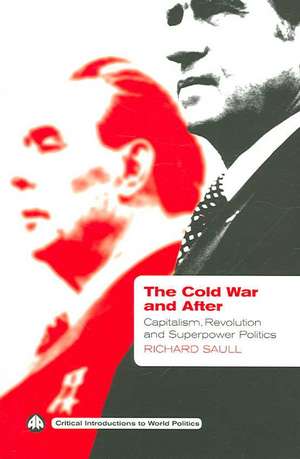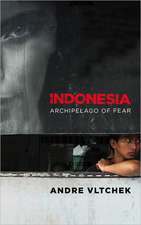The Cold War and After: Capitalism, Revolution and Superpower Politics
Autor Richard Saullen Limba Engleză Paperback – 19 ian 2007
Saull argues that US-Soviet antagonism was part of a wider conflict between capitalism and communism involving states and social forces other than the superpowers. The US was committed to containing revolutionary and communist movements that emerged out of uneven capitalist development.
In highlighting the socio-economic and ideological dimensions of the Cold War, Saull not only provides a richer history of the Cold War than mainstream approaches, but is also able to explain why revolutionary domestic transformations caused international crises. Tracing the origins of new resistance to American global power, Saull's book provides an ideal alternative perspective on the Cold War and its end.
Preț: 299.83 lei
Nou
Puncte Express: 450
Preț estimativ în valută:
57.38€ • 59.83$ • 47.69£
57.38€ • 59.83$ • 47.69£
Carte tipărită la comandă
Livrare economică 20 martie-03 aprilie
Preluare comenzi: 021 569.72.76
Specificații
ISBN-13: 9780745320946
ISBN-10: 0745320945
Pagini: 288
Dimensiuni: 150 x 230 x 15 mm
Greutate: 0.4 kg
Ediția:New.
Editura: PLUTO PRESS
Colecția Pluto Press
ISBN-10: 0745320945
Pagini: 288
Dimensiuni: 150 x 230 x 15 mm
Greutate: 0.4 kg
Ediția:New.
Editura: PLUTO PRESS
Colecția Pluto Press
Cuprins
Acknowledgements
1. Introduction: History and Theory in the Cold War
2. The International Impact of the Bolshevik Revolution and the Early Cold War, 1917-1945
3. The Cold War Transformed: Geopolitical Restructuring and a New Wave of Social Revolution, 1945-49
4. The Militarization of Cold War: The Containment of the USSR 4 and the Emergence of New Revolutionary Fronts, 1950-62
5. The Final Gasp of Cold War: The Decline of US Military Superiority and the Expansion of International Communist Power, 1962-80
6. Ending the Cold War: From Militarized Counter-Revolution to the Collapse of Soviet Communism, 1980-91
7. Conclusions: Tracing the Paradoxical Ends of the Cold War and the Origins of Contemporary Conflict in World Politics
Select Bibliography
Index
1. Introduction: History and Theory in the Cold War
2. The International Impact of the Bolshevik Revolution and the Early Cold War, 1917-1945
3. The Cold War Transformed: Geopolitical Restructuring and a New Wave of Social Revolution, 1945-49
4. The Militarization of Cold War: The Containment of the USSR 4 and the Emergence of New Revolutionary Fronts, 1950-62
5. The Final Gasp of Cold War: The Decline of US Military Superiority and the Expansion of International Communist Power, 1962-80
6. Ending the Cold War: From Militarized Counter-Revolution to the Collapse of Soviet Communism, 1980-91
7. Conclusions: Tracing the Paradoxical Ends of the Cold War and the Origins of Contemporary Conflict in World Politics
Select Bibliography
Index
Descriere
An alternative perspective on the Cold War that broadens our understanding of the nature of political conflict.









